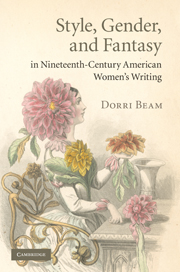Book contents
- Frontmatter
- Contents
- Acknowledgements
- Introduction. Highly wrought style
- 1 Florid fantasies: Fuller, Stephens, and the “other” language of flowers
- 2 Sensing the soul: mesmerism, feminism, and highly wrought fiction
- 3 Harriet Prescott Spofford's philosophy of composition
- 4 Pauline Hopkins' baroque folds: the styled form of Winona
- Coda: The value of ornament: Gilman and Wharton
- Notes
- Bibliography
- Index
2 - Sensing the soul: mesmerism, feminism, and highly wrought fiction
Published online by Cambridge University Press: 05 October 2010
- Frontmatter
- Contents
- Acknowledgements
- Introduction. Highly wrought style
- 1 Florid fantasies: Fuller, Stephens, and the “other” language of flowers
- 2 Sensing the soul: mesmerism, feminism, and highly wrought fiction
- 3 Harriet Prescott Spofford's philosophy of composition
- 4 Pauline Hopkins' baroque folds: the styled form of Winona
- Coda: The value of ornament: Gilman and Wharton
- Notes
- Bibliography
- Index
Summary
In an article entitled “A Panegyric on Witchcraft, Mesmerism, and Cheap Literature” written for The Columbian Magazine in 1846, James Kirke Paulding satirically commends the practitioners of witchcraft, mesmerism, and cheap literature for offering “a positive and acute pleasure arising from what are called excitements.” As befits his analogy, Paulding figures the “exploits of Mesmerism” in much the same way as one might figure the exploits of a heroine of popular literature. While the body is “insensible to pain” during the trance state, the soul becomes
totally independent of its old associate, leaving it fast asleep and wandering away to distant regions, seeing sights without the aid of eyes, and exercising all the functions of the five senses, without waiting for the participation of the honest old clay image, which remains quietly at home like an obedient husband while his wife is gadding about enjoying all the delights of a locomotion, exceeding in speed the famous wooden horse of the Arabian knights, the achievements of Aladdin's lamp, or the magical arrow of Abaris the Scythian. (213)
Paulding equates the titillation offered by this mesmerist excursion into “the spheres” to the excitement produced by an excursion out of woman's sphere. Likewise, Paulding notes that cheap literature departs from traditional gendered expectations by discarding “the old rusty dogma which makes chastity the prime virtue of woman and exploding the vulgar error, that virtue and vice are direct contrasts and cannot act in perfect harmony with each other” (213).
- Type
- Chapter
- Information
- Publisher: Cambridge University PressPrint publication year: 2010



